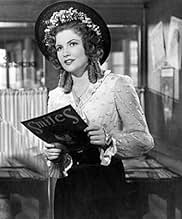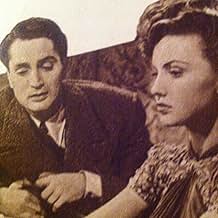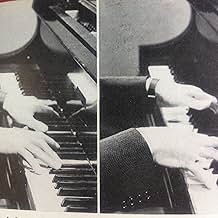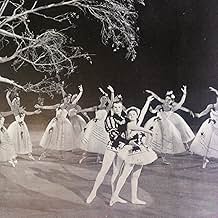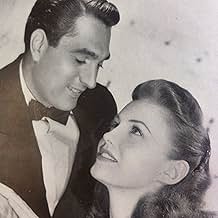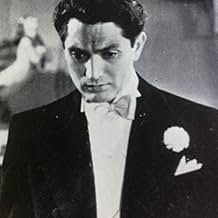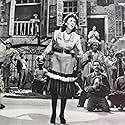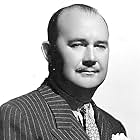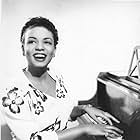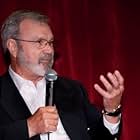IMDb RATING
7.0/10
1.9K
YOUR RATING
George Gershwin is a driven composer whose need to succeed destroys his relationship with singer Julie Adams and socialite Christine Gilbert.George Gershwin is a driven composer whose need to succeed destroys his relationship with singer Julie Adams and socialite Christine Gilbert.George Gershwin is a driven composer whose need to succeed destroys his relationship with singer Julie Adams and socialite Christine Gilbert.
- Nominated for 2 Oscars
- 2 wins & 4 nominations total
Albert Bassermann
- Prof. Franck
- (as Albert Basserman)
Rosemary DeCamp
- Rose Gershwin
- (as Rosemary De Camp)
Featured reviews
This film presents many Gershwin tunes in great fashion with several great settings and great production numbers. Yes, it's unfortunate that the story line is so heavily fictionalized and even misleading. But, the sets are honest to the periods covered, several sequences are very tastefully done and fun, the show excerpts are good, and did I mention the music? As several other commentators have indicated, the music is faithfully recreated in long segments that bring you much or all of the tune.
If you come to this film to hear some wonderful Gershwin performed by some great artists staged with a lot of character and splash (my favorite set is Hazel Scott's Paris show), you won't be disappointed. The story line is simply a convenient string to tie together the thread of music.
If you come to this film to hear some wonderful Gershwin performed by some great artists staged with a lot of character and splash (my favorite set is Hazel Scott's Paris show), you won't be disappointed. The story line is simply a convenient string to tie together the thread of music.
As with most Hollywood biopics (particularly back in the 1930s, 40s, and 50s), this account of the life of George Gershwin is somewhat fictionalized. As just one example, in real life he also had two sisters, who are not even mentioned in the film. And, the romantic angles here (with two women) apparently are fictionalized. But, so what. This is a surprisingly entertaining film, and a number of Gershwin's pieces are faithfully executed, including "Rhapsody In Blue". I watched this quite a long time ago and remembered it as one of the better movie biopics...plus, I rather like Gershwin's music. I think I liked this film better the second time around.
Robert Alda is fine in the lead role, as are others in supporting roles, including Charles Coburn as a mentor on the pop side of things. Particularly interesting are the many "cameo" appearances by real associates of Gershwin -- Al Jolson ("Swanee"; although so clearly too old to play a young Jolson!), George White (of the famous "Scandals"), and Paul Whiteman. Supporting players are good here -- Joan Leslie, Alexis Smith, especially Albert Bassermann, Rosemary DeCamp, Oscar Levant, and Herbert Rudley (as Ira Gershwin).
At just over 2:20, it's a long movie, but that length allows so much of the Gershwin music to be played. I can't help but compare this to the Cole Porter biopic starring my favorite actor -- Cary Grant; but this is so much better a film. A good movie worth watching at least once for the acting and to revel in the music.
Robert Alda is fine in the lead role, as are others in supporting roles, including Charles Coburn as a mentor on the pop side of things. Particularly interesting are the many "cameo" appearances by real associates of Gershwin -- Al Jolson ("Swanee"; although so clearly too old to play a young Jolson!), George White (of the famous "Scandals"), and Paul Whiteman. Supporting players are good here -- Joan Leslie, Alexis Smith, especially Albert Bassermann, Rosemary DeCamp, Oscar Levant, and Herbert Rudley (as Ira Gershwin).
At just over 2:20, it's a long movie, but that length allows so much of the Gershwin music to be played. I can't help but compare this to the Cole Porter biopic starring my favorite actor -- Cary Grant; but this is so much better a film. A good movie worth watching at least once for the acting and to revel in the music.
Rhapsody in Blue, is a true black and white American classic. I bought the tape because of the title, which is one of the pieces written by George Gershwin. I had the privilege of going to the Library of Congress in Washington, D.C., and xeroxing some of Gershwin's hand written sheet music with his own signature in it. Wow! Just like he signs his name in the movie. The movie starts with his and his brother, Ira's, childhood, when they get the piano for Ira to play. Turned out that George became the pianist and Ira the lyricist. George never married but the movie is a love story between George and singer "Julie Adams" Joan Leslie (Yankee Doodle Dandy), who truly loved him. He was also romantically involved with Alexis Smith "Christine Gilbert" (The Age of Innocence). She was a socialite painter who lived in Paris. George would have married Julie, but he somehow was married to his music and ended up never marrying Julie, due to his early death. Each scene of the movie has the rhythm of Gershwin's music and the music played is a piece which corresponds that period of his life. To my surprise Al Jolson plays himself where he sings and dances. Remember him the guy that Warner Brothers decided to star him in their first partly-talking-picture, "The Jazz Singer" in 1927. The two Gershwin's had a wonderful relationship with their parents and Ira became their parent's caretaker because George traveled a lot. I love the fact that "George Gershwin" is played by Robert Alda (Imitation of Life), a great actor and singer and also father one of my favorite actors Alan Alda (M.A.S.H., Same Time, Next Year). Talent runs in the families in the cases at hand, (the Aldas and the Gershwins) and Robert and Alan Alda they looked a lot alike. This is a must see for anybody to see, specially Gershwin fans such as myself. It has an imaginable body of their work in this movie, their music is vibrant and happy. Favorite Scenes: Gershwin's parents getting their first piano to their apartment I believe up to the sixth floor of the building where they lived. George getting fired when he meets Julie because he gives her his own work to sing. Favorite Quotes: Ira: "Good Night Mr.Music." George: "Thank you Mr. Words." George: "It is only with music that I can prove my right to live." Dad Gershwin to George: "Take time to be happy, George." This is a great old fashion movie I think that you will love it as I have.
RHAPSODY IN BLUE (Warner Brothers, 1945), directed by Irving Rapper, subtitled "The Story of George Gershwin," is a tribute to America's most original composer of the twentieth century. It's an entertaining musical biography if one could overlook its faults. Made at the time when movies of this type dominated the screen, beginning with YANKEE DOODLE DANDY (1942) with James Cagney as actor and songwriter George M. Cohan, Warners later contributed another using a song title to personify the subject matter, Cole Porter in NIGHT AND DAY (1946) as portrayed by Cary Grant. Obviously YANKEE DOODLE DANDY is the best of the three, however, while NIGHT AND DAY offers an added plus with Technicolor, it makes RHAPSODY IN BLUE better than what it is. Unlike the two mentioned bio-pics, RHAPSODY IN BLUE is not headlined by a major name, but a newcomer named Robert Alda, who, unlike Cagney and Grant, never became a top rank star. One thing going for Alda is his resemblance to George Gershwin, and how acceptable he is in what has become his best known film role. Unfortunately, that's where the Gershwin legend ends. Hoping for another YANKEE DOODLE DANDY, Warners reused its co-stars, Joan Leslie as the fictitious girlfriend, and Rosemary DeCamp as the mother, the sort of roles they've done before. The result: the music that outscores an episodic story.
The story of George Gershwin, according to an original story by Sonya Levien, opens on the lower East side of Manhattan with brothers George and Ira Gershwin as boys (Darryl Hickman and Mickey Roth) watching men delivering a piano to their apartment. The piano was ordered for Ira to take lessons, but their mother, Rose (Rosemary DeCamp) can't help but notice George's natural talent for the piano without a single lesson. Years pass, the now adult George (Robert Alda), develops a new method in piano playing, lands a job playing songs for customers, getting himself fired for going against management by demonstrating his own songs. In time, he gets his big break when publisher Max Dreyfus (Charles Coburn) introduces Gershwin's latest composition, "Swanee," to Broadway entertainer Al Jolson, who likes the song so much that he introduces it in his next Broadway show, SINBAD. Jolson's delivery to "Swanee" elevates Gershwin into an exceptional and most original composer. Collaborating his songs with Ira (Herbert Rudley), Broadway shows featuring one hit song after another, along with George's on and off romances with Julie Adams (Joan Leslie), a singer who loves him, and Christine Gilbert (Alexis Smith), a socialite/ divorcée who knows she'll be nothing more than a backdrop to his life. In spite of fame and fortune, especially with his masterpiece, "Rhapsody in Blue," George is not a happy man, and strives to improve himself, doing everything in such quick pace as if he has some premonition of an untimely death.
The supporting players feature Julie Bishop as Lee Gershwin; Albert Basserman as Professor Frank; Morris Conovsky as Morris Gershwin; Johnny Downs as a tap-dancer; with Paul Whiteman, George White, Tom Patricola, Hazel Scott guest starring as themselves. A pity that Fred Astaire, whose best known for introducing some classic Gershwin tunes, didn't appear. The highlight of the program is Al Jolson singing "Swanee." This became Jolson's final contribution to the motion picture by which he takes part in the plot, but this would not be the last time his voice would be heard on screen. Jolson appears in two key scenes, each in his black-face trademark, first from his dressing room on the telephone and later on opening night. While age has caught up with Jolson physically, his delivery to "Swanee" proves he still has that old magic. A pity he didn't contribute more to the story. Oscar Levant, playing his usual droll self, provides some amusing moments as Gershwin's close friend, as well as his piano solos.
Of the many songs composed by George Gershwin, the ones selected for the soundtrack include: "Smiles," (not by Gershwin); "Swanee," "S' Wonderful, S' Marvelous," "Somebody Loves Me," "I'll Build a Stairway to Paradise," "Lady Be Good," "Blue Monday Blues" followed by "My Joe" and "Mother Mine," "Rhapsody in Blue" (conducted by Paul Whiteman); Braham's "Lullaby" (background score); Hazel Scott's piano playing and vocalization of "The Man I Love" (in French); "Clap Yo Hands," "Fascinatin' Rhythm," "I Got Rhythm" and "Yankee Doodle Blues"; "Liza," "Bidin' My Time," "Embraceable You," "An American in Paris" (instrumental); "Cuban Rhapsody," "Our Love is Here to Stay," "Delicious," "Summertime" from PORGY AND BESS; "Concerto in F", "135th Street Blues," "Love Walked In," "Concerto in F" (reprise); and "Rhapsody in Blue"(reprise/finale).
Not historically accurate as one would like it to be, although the costumes and hair styles do fit into the time frames, RHAPSODY IN BLUE should be a delight for Gershwin fans, considering how it concentrates more on his songs than on his personal life. Running more than two hours, the narrative includes several scenes that drag on, but as long as there's enough Gershwin music to fill in the void, it shouldn't appear endless.
RHAPSODY IN BLUE, may not be the success in the tradition of YANKEE DOODLE DANDY nor Robert Alda as legendary as James Cagney, but George Gershwin's contribution to American music, jazz, blues and/or folk opera, remains legendary. RHAPSODY IN BLUE formerly available on video cassette, is shown on Turner Classic Movies. Running time: 142 minutes - "a very important piece." (***1/2)
The story of George Gershwin, according to an original story by Sonya Levien, opens on the lower East side of Manhattan with brothers George and Ira Gershwin as boys (Darryl Hickman and Mickey Roth) watching men delivering a piano to their apartment. The piano was ordered for Ira to take lessons, but their mother, Rose (Rosemary DeCamp) can't help but notice George's natural talent for the piano without a single lesson. Years pass, the now adult George (Robert Alda), develops a new method in piano playing, lands a job playing songs for customers, getting himself fired for going against management by demonstrating his own songs. In time, he gets his big break when publisher Max Dreyfus (Charles Coburn) introduces Gershwin's latest composition, "Swanee," to Broadway entertainer Al Jolson, who likes the song so much that he introduces it in his next Broadway show, SINBAD. Jolson's delivery to "Swanee" elevates Gershwin into an exceptional and most original composer. Collaborating his songs with Ira (Herbert Rudley), Broadway shows featuring one hit song after another, along with George's on and off romances with Julie Adams (Joan Leslie), a singer who loves him, and Christine Gilbert (Alexis Smith), a socialite/ divorcée who knows she'll be nothing more than a backdrop to his life. In spite of fame and fortune, especially with his masterpiece, "Rhapsody in Blue," George is not a happy man, and strives to improve himself, doing everything in such quick pace as if he has some premonition of an untimely death.
The supporting players feature Julie Bishop as Lee Gershwin; Albert Basserman as Professor Frank; Morris Conovsky as Morris Gershwin; Johnny Downs as a tap-dancer; with Paul Whiteman, George White, Tom Patricola, Hazel Scott guest starring as themselves. A pity that Fred Astaire, whose best known for introducing some classic Gershwin tunes, didn't appear. The highlight of the program is Al Jolson singing "Swanee." This became Jolson's final contribution to the motion picture by which he takes part in the plot, but this would not be the last time his voice would be heard on screen. Jolson appears in two key scenes, each in his black-face trademark, first from his dressing room on the telephone and later on opening night. While age has caught up with Jolson physically, his delivery to "Swanee" proves he still has that old magic. A pity he didn't contribute more to the story. Oscar Levant, playing his usual droll self, provides some amusing moments as Gershwin's close friend, as well as his piano solos.
Of the many songs composed by George Gershwin, the ones selected for the soundtrack include: "Smiles," (not by Gershwin); "Swanee," "S' Wonderful, S' Marvelous," "Somebody Loves Me," "I'll Build a Stairway to Paradise," "Lady Be Good," "Blue Monday Blues" followed by "My Joe" and "Mother Mine," "Rhapsody in Blue" (conducted by Paul Whiteman); Braham's "Lullaby" (background score); Hazel Scott's piano playing and vocalization of "The Man I Love" (in French); "Clap Yo Hands," "Fascinatin' Rhythm," "I Got Rhythm" and "Yankee Doodle Blues"; "Liza," "Bidin' My Time," "Embraceable You," "An American in Paris" (instrumental); "Cuban Rhapsody," "Our Love is Here to Stay," "Delicious," "Summertime" from PORGY AND BESS; "Concerto in F", "135th Street Blues," "Love Walked In," "Concerto in F" (reprise); and "Rhapsody in Blue"(reprise/finale).
Not historically accurate as one would like it to be, although the costumes and hair styles do fit into the time frames, RHAPSODY IN BLUE should be a delight for Gershwin fans, considering how it concentrates more on his songs than on his personal life. Running more than two hours, the narrative includes several scenes that drag on, but as long as there's enough Gershwin music to fill in the void, it shouldn't appear endless.
RHAPSODY IN BLUE, may not be the success in the tradition of YANKEE DOODLE DANDY nor Robert Alda as legendary as James Cagney, but George Gershwin's contribution to American music, jazz, blues and/or folk opera, remains legendary. RHAPSODY IN BLUE formerly available on video cassette, is shown on Turner Classic Movies. Running time: 142 minutes - "a very important piece." (***1/2)
The music was wonderful, I enjoyed watching the father of Alan Alda in the title role & I got one "mini surprise"! That was the solo song of a very young, enchanting Hazel Scott, accompanying herself on the piano. She was a musical prodigy on the piano from the age of 4 and the youngist student admitted to the Julliard School of Music at age 16. This was the last of her early film appearances, as she focused more on musical recordings and a TV series, until the late 50s. She also married Adam Clayton Powell Jr., noted congressman from Harlem & civil rights activist. Her 1955 album, "Relaxed Piano Moods," recorded with Charles Mingus and Max Roach was recently reissued on CD & named Album of the Month by National Public Radio.
Storyline
Did you know
- TriviaChico Marx sued Warner Bros for $200,000 for damages and "payment owed for services rendered." Marx alleged that the filmmakers used his name many times in the film. Studio officials admitted that Marx's name had been used in the film, but were unclear about what services the comedian had rendered. The parties settled for $10,000.
- GoofsChico Marx is referred to early in the film. Gershwin mispronounces the name as "CHEE-ko", which generally continues to this day. Chico's name is correctly pronounced as "CHICK-o".
- Quotes
Oscar Levant: Tell me something, George... if you had it to do all over again, would you still fall in love with yourself?
- ConnectionsEdited into The Story of Will Rogers (1952)
- SoundtracksEmbraceable You
(uncredited)
Music by George Gershwin
Lyrics by Ira Gershwin
Sung by Joan Leslie (dubbed by Sally Sweetland)
- How long is Rhapsody in Blue?Powered by Alexa
Details
- Runtime2 hours 15 minutes
- Color
- Aspect ratio
- 1.37 : 1
Contribute to this page
Suggest an edit or add missing content



